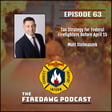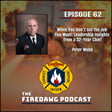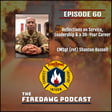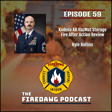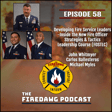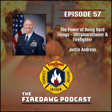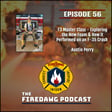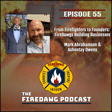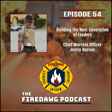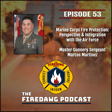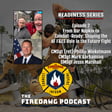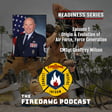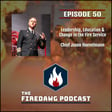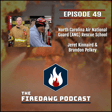Introduction of AJ Keel
00:00:13
Speaker
Welcome, my name is Chris Boykley and thank you for joining us on episode 51 of the Firedog Podcast. In this episode, I have the privilege of speaking with one of our only two-time guests,
00:00:25
Speaker
Chief Master Sergeant AJ Keel, who was also on episode three. Chief Keel is Fire Chief at Masao Air Base in Japan. He's got a master's degree in organizational leadership and has earned the Fire Officer, Chief Fire Officer designation from the Center of Public Safety Excellence. He's authored the book, My Rich Uncle, been honored as one of the Air Force's 12 Outstanding Airmen of the Year. That was 2019. 2019, yeah.
Leadership Journey of AJ Keel
00:00:53
Speaker
2019 and now serves as a speaker and a leadership coach. Chief, welcome. Hey, thanks, Chris. Good to be here, man. And thanks for letting me come on with this amazing ah first time in my career beard.
00:01:04
Speaker
I love it. It looks good. I'm jealous. If I could grow em half of that, I would be a happy man. You know, they never gave a paternity leave for the first, you know, 16, 17 years of my career. And now they give you three months and it's an opportunity. I didn't know the gray would come out, but I guess it's showing the age. You know, oh it looks good. It makes you look distinguished. Thanks, brother. I appreciate it. Good to be here. man So before we get into it, will you ah just hit us with a little bit more about your story?
Importance of Negotiation Skills
00:01:31
Speaker
Yeah, yeah, I appreciate that. So ah for those that don't know me, I'm AJ Kiel. I'm currently the fire chief in Masawa, Japan. Prior to that, I was fire chief at Dover, Delaware. And prior to that, fire chief in Kunsan, Korea. So for those of you that have been part of the Wolfpack, it's a special place. um Been in the Air Force 21 years. Fire the whole way.
00:01:50
Speaker
overseas the majority of the time, and and that's um as we'll talk later, that's where I get a lot of my leadership philosophy from because I've dealt with predominantly military, whereas I had limited time in the States dealing with you know um the the ins and outs of working with our GS folks. I have as a fire chief at Dover, but the vast majority was overseas, so a lot of local nationals um and a lot of GIs. um So along the way, stayed in fire. I was functional the whole way. And then I had a little stint where I did innovation. So I stood up the innovation office over at Spindollum, Germany in 2015. And I had the just amazing opportunity to learn how to improve processes at the wing and the matchcom level in Europe. And then I took a lot of those skills.
00:02:38
Speaker
and brought them back over to fire where I focus predominantly on you know trying to improve processes and programs. So that's me in a nutshell, functional the whole way, proud to be a fire dog, proud to be a part of this amazing community. And now I'm retiring here in the next ah next little bit and passing the torch to the next guys. Outstanding. Well, it sounds like you've got some good breadth of of fire service leadership in all kinds of different settings. And so we've brought you here to talk to us about negotiating. Yeah. why did Yeah. Why should firefighters, the fire officer, the fire chief, care about?
00:03:16
Speaker
and having negotiating skills. Yeah, I appreciate that. You know, that's a great question. I mean, negotiation is not something, it's usually something I think about if I'm going to be like a used car salesman, not really ah a fire officer. But you know, the fact is, is we negotiate every single day in the fire service, um whether you're coordinating with multiple agencies or stakeholders, or maybe you're, you know, trying to help a dispute between team members on shift responsibilities. Maybe you need to advocate ah for new fire equipment or you're trying to get additional staffing. um Maybe you want updated facilities. These are all things that you need to and ah negotiate and advocate. um You might be leading a team with different personalities, goals, and levels of experience. You're going to need to know how to navigate those different personalities almost like a coach.
00:03:59
Speaker
um Maybe you're engaging with the community and you want to build trust, addressing different public concerns they may have. um Or even if you're just navigating promotional opportunities and advocating for your own professional development, you're going to need to know
Everyday Negotiation Techniques and Scenarios
00:04:12
Speaker
how to negotiate. And so what I did was naturally um Started looking into books that I can learn how to negotiate and I came across two specific books that really have helped me along the way and I'd love to recommend them to the listeners and that is the first one is Crucial Conversations. ah Crucial Conversations is just a phenomenal book about
00:04:32
Speaker
when the stakes are high and emotions are running high, that's when you know you're in a crucial conversation. and What you say next is going to determine that outcome. um Really learned a lot from crucial conversations. and The second one, which is something I'll talk about ah here in this and and this podcast, is that Chris Voss' Never Split the Difference. so The book is called Never Split the Difference by Chris Voss. He was actually a hospice negotiator for many decades.
00:04:58
Speaker
um When I read that book, man, I went, wow, this these negotiation strategies have a perfect parallel to the fire service. And so I learned a lot about negotiating within the fire service. But then also in everyday life, I learned a little bit of kind of ways that you can nudge people to, you know, kind of influence what you're getting after. So um that's how that's how I came across it. And I do think it's very applicable to fire service. I feel like a lot of people when they hear the the word, you know,
00:05:26
Speaker
negotiation. They picture that used car salesman. They picture a high stakes sales situation when really we're all involved in negotiations every single day in multiple ways when really we may not realize that we're we negotiating. that's right and so What some examples as a fire chief where um yeah it could be recent or they could be you know, over the course of your career where you you've been involved in a negotiation with the commander or with another ah firefighter,
00:06:05
Speaker
yeah what are some things that come to mind? Yeah, so the thing that comes to mind right away is when we talk about additional staffing needs in the fire service, right? I mean, you know, um when you're trying to sell your position, as you know, everyone feels like their their job, their center, their
Communication and Sales in Negotiation
00:06:23
Speaker
manpower need is the most important. right So how do you distinguish yourself from the others? You need to be able to negotiate and advocate for the reasoning that you need that staffing. um So that that just comes to mind many times I've been doing it when it comes to additional staffing and then also new equipment um as well as professional opportunities. Something that we don't do as well as I think we should is that holistic self-improvement where
00:06:46
Speaker
um Why shouldn't we spend this amount of money on the professional development of our people outside of the kind of air force sphere so oftentimes I find myself negotiating on behalf of my people to get them out to go do you know additional school type stuff or additional certifications that are outside the norm, but then they can bring it back. and A great example of that is the coaching certifications through the ICF. So the International Coaching Federation sending people out to that, they come back and now honestly, they're they're just better supervisors. They know how to develop those interpersonal relationships a lot better. And I think that that all comes from the ability to negotiate those needs. Yeah, that's the ah number one thing that jumps out of my mind for the fire chief or the ah any senior listed leader is negotiating with the commander.
00:07:33
Speaker
Yep. Right. Especially in CE where, ah you know, CE commander has a ton of things they're responsible for. um It's a pretty, pretty wide ah squadron to lead. It is. Right. Everything that that we've got, you know, on our plate as civil engineers. And so you're talking to a a civil engineer likely who has no background in firefighting.
00:08:01
Speaker
Maybe they've gone back to Goodfellow for the you know the for the what what is it the orientation course. the yeah the two week It's like a one or two week course for the base fire marshal. That's probably it. The communication skills and ultimately the sales skills right to paint a picture for them of of what you're talking about. I imagine you've got to use on a pretty regular basis. That's absolutely correct. You absolutely do. And it starts with building that foundation of trust with them. you know These commanders, they're relying on you and what you're saying, especially when it comes to you know your risk management skills. you know you um Like you said, they have very limited experience. and And truthfully, they're busy often with other things, especially infrastructure, um you know ah other facets of the Civil Engineer Squadron. And so they rely heavily on that chief fire officer to be able to
00:08:56
Speaker
to be able to advocate and negotiate what they need and then they need to trust that you're saying the right things when they're allocating resources. So there's definitely there's definitely a foundation in negotiation with you and a commander. Yeah, I feel like that's something that's really kind of clicked with me personally as my careers progressed where early on you know I thought you know as a leader if I you know worked hard right I was a servant leader did everything I could to be smart and aware of everything that you know we're responsible for, that that things would go well, but you can be the smartest, man hardest working leader in the world and be totally ineffective if you can't negotiate and ultimately sell people on the plan or the vision for what you think is best for your fire department. ye So what are some ah
00:09:48
Speaker
some negotiation tactics that you use on a regular basis to, um, to
Applying Negotiation Tactics
00:09:53
Speaker
do those things. Yeah. Well, you know, I started kind of with like, okay, I want to be a good, I want to be good at negotiating and advocating and in my role as a chief officer, but in everyday life, taking it back. What are some simple things that I learned? And and Chris Voss from Never Split the Difference, in his book, he has some really good tactics. And the one that stuck out to me the most, and I'll tell you, Chris, it's crazy. I hope listeners, you guys have to try this out. It's it's really phenomenal. When you call somebody,
00:10:22
Speaker
instead of saying, are you busy, you say is now a bad time. And I'll tell you, it is such a psychological way of getting 1000% of their attention because most of the time when you say is now a bad time, not only do they say, no, it's not, but you have 1000% of their attention and their attention is what you want in the first place when you're negotiating in life, right? So, and if they say,
00:10:47
Speaker
It is a bad time, but I'm free 1 o'clock Tuesday. Well, now you know at 1 o'clock Tuesday you have 1000% of their attention because in today's busy world, you know you you can't have 50% of their attention because you're not going to be able to get your point across and it's not going to be absorbed. um So is now a bad time and if they say it is a bad time well.
00:11:06
Speaker
You probably don't want their attention anyway, right? So replacing, are you busy, which is a very easy way to be like, yeah, what's up? I'm yeah i'm busy. You don't have a thousand percent of them. Whereas if you say is now a bad time, it's better. Another one that I use every day is ah When you want to test the waters on something, when you're trying to, let's say you're managing your fire shift schedule um and you you need to make a move that you don't know how that individual is going to react to the move. It could be it could be you're trying to switch somebody from A-shift to B-shift, whatever the case may be. Starting out with, is it a ridiculous idea?
00:11:44
Speaker
right instead of Instead of, what do you think about this? Hey, is it a ridiculous idea if we moved you over to the other shift to allow our crew chief leveling and and provide you the opportunities that I know you've been seeking? When you want to test the waters, starting with, is it a ridiculous idea? it really The word ridiculous, just it it brings the barriers down and it makes people just kind of more attuned to what you're trying to say. So I love that one as well. A third one here.
00:12:11
Speaker
is whenever you're given a quote, let's say you're going to buy a car or you know you're negotiating where there's money involved. Maybe you're negotiating with a vendor and like fire logistics or something. saying When they give you a quote, and it may not really work, maybe it's a little high, starting your your reaction with, how am I supposed to do that?
00:12:32
Speaker
It is an interesting way of allowing them to bid themselves down. You'd be surprised how often people bid themselves down. Let's say somebody's like, hey, man, I'll do your landscaping for $100. And you go, okay, well, $100, how do you suppose I do that?
00:12:50
Speaker
Oftentimes, they'll be like, well, what what what can you do, right? Well, I can do 75 spine, you know, or whatever it may be. So how am I supposed to do that when given a quote? And then finally, another one that kind of set the foundation for my negotiations in everyday life is ah we get those times where people don't respond to you. Maybe it's an email or instant message or something. When you've been ghosted,
00:13:13
Speaker
What I like to hit them back with sometimes is, hey, have you totally given up on text? Let's say you know you're trying to negotiate something and you know the communication has failed. Hitting them back with, hey you know hey, Chris, have you totally given up on blank?
00:13:30
Speaker
It is a very good way to hit that reset button. And oftentimes they will reply to you when you say that. And now is your chance to be very active in your listening and don't let that communication break down again. So when you have a break in communication, have you totally given up on that's another way that Chris Voss, those four are the ones that set the foundation for me to learn more about negotiating. So kind of a common theme I'm i'm hearing there by asking is now a bad time.
00:13:56
Speaker
Or have you given up on this? Or is this a ridiculous idea? You're encouraging the other party to say no. Right. That's right. That's right. And then elaborate. And then elaborate, right? Yeah, you want because you want their underlying motivation. you want You want to know specifically what they're trying to get at. um And finally, sometimes if you're really trying to get their underlying motivation and somebody says something, you just reply back with, well, why do you ask? And genuinely, not you know not to be facetious, but genuinely, well, why do you ask? so
00:14:29
Speaker
And they will continue that dialogue and you'll you'll be able to get to whatever their underlying
Growth through Reading and Audiobooks
00:14:34
Speaker
motivation is, what they're really saying. And then you can target your response more effectively. So the open ended question. Right. Yeah, that's right. The open ended question. So I've. I've heard people talk about, you know, obviously the the superpower that is a good open ended question and how you can you can harness that power by Simply paying attention to how you start your question. If you start your question with, can we, or is this, are, do, does, you're, you're encouraging a yes or no response. Can we do this compared to starting a question with how, or what, what's the best way to do this? It totally changes the framing of.
00:15:26
Speaker
the entire interaction. It absolutely does. You are right on target, man, and it gets to that underlying motivation that we're talking about. um A couple examples to your point, Chris, is, you know hey, ah what's most important to you in this deal? right That's an open-end question that you're going to immediately get to the underlying motivation. um Hey, how do you see this working out for both of us?
00:15:47
Speaker
another way that now they have to increase the dialogue to get to the underlying motivation. And then finally, so what are the biggest challenges you're facing right now? Those open-ended questions are going to really get all the information out. um When you do the closed-ended questions, the dialogue you know stops right on a dime, and then you kind of have to start over and try to reset ah the communication. So I 100% agree with you, man. It's very, very cool stuff. I love this stuff, man. it's it's It's interesting because it it it really is skills that are applicable to not just the fire service, but to everyday life, which I value big time because ultimately we have a big turnover of people in um Air Force and DoD fire. And what we're really doing is we're not just setting up people to be great war fighters or great firemen. We're setting them up to be great citizens, right? And we want them to succeed and be able to take care of their families. And so they need to know
00:16:40
Speaker
ah They need to develop and always as a person, as a human being, and not just specifically the things that we need while they're in the service. Right. Well, those are obviously things you can use in whatever's next for you. After the military, you can use it as a father or as a spouse or yeah ah very applicable throughout your entire life. I feel like people have this mindset of like ah either you're a good negotiator or you're not, you're a good communicator or you're not. These are all very learnable skills right if you take the time.
00:17:17
Speaker
right It all starts with reading as a catalyst. I mean, I can't emphasize that enough. like i you know i um I didn't really go too far into it, but like many people in the enlisted Air Force right were enlisted as military firefighters. um i didn't have I didn't have a degree when I joined. And truthfully, you know I come from a trailer park where my mom was a single mom.
00:17:38
Speaker
ah raising me and my brother. And you know I joined the Air Force um mainly because shortly after 9-11, but also because I knew that I could get this education that I that i that i wanted, right? And as i yes, I went to college. Thankfully, um I went to college while I was in. But I would say the vast majority of whatever little brain cells I have going on,
00:18:01
Speaker
is from reading, man. um you know i started I started. I tried to be real awesome about it and say, I'm going to read an hour a day. That didn't work. Then I said 30 minutes a day. That didn't work. I got down to five minutes a day, Chris. And it worked at five minutes. And then over time, I scaled it. right And you know I'm probably about an hour now. But you'd be surprised when you look back after a year, if you just can do 20 minutes a day,
00:18:25
Speaker
The amount of things you learn when you have some of the most successful people like Chris Boss, for instance, where they in 250 pages, they put 30 years of their work, right? 30 years of negotiating in 250 pages. um Reading is really the thing that I would encourage all firefighters that they need to be reading. And so at Masawa Fire, we have a library up front and our we have we have all kinds of books in there that people don't need to check out. Just grab it, take it. Whether you bring it back or not, it's irrelevant.
00:18:53
Speaker
But we buy books at Masawa Fire and it's it's pretty cool when you see people just sitting there reading the book on something that is going to make them better. Yeah. You know, I've totally seen that in my own life too, where it's like, maybe I set a goal at the beginning of the year of, I want to read a book a month or I want to study these topics. And when it's this massive, you know, one year goal, it can feel, you know, impossible at times, right? You get behind, you're not really reading, you feel like you got to you know, carve out a whole afternoon to, you know, accomplish something. But if each night before bed, if I read two pages, so guess what? You look up and you know, you you've made some serious progress by taking that kind of consistent action at learning whatever you're trying to learn. That's right.
00:19:43
Speaker
That's right. It's it couldn't I can't overstate how important how important reading is. And it the people that I the smartest people I know across the fire service are all readers. And I know that's very cliche. I get it. But it really is the truth. They're all readers. Yeah. You know, a little hack that I've discovered this year. So a big podcast guy. But I think really side. Yeah. Yeah. Shocker is, you know, you you kind of are drawn to um certain confirmation biases. You see po podcast episodes that are, you know, click with things that you are thinking about or that you care about. i And they're 45 minutes long and it's hard to get any kind of depth, but, um, and audio books. And I found our, uh, public library here in Indianapolis as a free app where you can get pretty much any book on an audio book. Nice. And so that's ah been a huge pivot this year where I've gone from
00:20:39
Speaker
Maybe I got through a six books, something like that last year, and probably tripled that yeah by listening to audio books instead of podcasts. And I feel like I get way more depth yeah from it. So actually, Chris Foss's book that you mentioned earlier, I never split the difference with one that I just finished up. Oh, cool. And i I love how he talks about mirroring and labeling as negotiation tactics. Are those are those tactics that you use?
00:21:09
Speaker
Yeah, absolutely. right So um you're listening you're listening for pain points when you're mirroring. right You want to make them feel heard. And you want to you want to build trust and keep the conversation going. So mirroring um is when you're repeating the other person's words. right So and a simple example that I've used is you know that say to say, hey, I feel like my contributions aren't being valued by the team. And your response could be not being valued.
00:21:33
Speaker
Yes, I've been putting in extra hours, but no one's acknowledging it. Extra hours. Now all of a sudden, right you're getting you're you're starting you're starting to really get down to the problem so you can address it effectively. Maybe you didn't even know that it's about extra values because it started with my contributions are not being valued.
00:21:50
Speaker
um And another thing with mirroring too that Chris Fox alluded to in his book was using the power of the pods. When you're silent, you you make the other person want to speak. right So when you're listening to them and you and you mirror, just be silent. And that's something I struggle with because i I like to talk. But if I'm just silent, I can start getting through those layers of what they're really trying to say. So yeah, mirroring is a good one.
Body Language in Negotiations
00:22:16
Speaker
Yeah. well how many How many times would that interaction go?
00:22:20
Speaker
you know I feel like my my contributions aren't being valued, and the other party would reply with, we value your contributions. yeah And now, instantly, you're in opposition. You don't know anything else about why the other party is saying what they're saying.
00:22:37
Speaker
right Um, and you're likely not to get anywhere. Wow. That's it. And that's a great point, Chris. Great point. Yeah. You've, you've completely turned it and kind of made it about you. And now they're on the defensive. Yeah. It's great. Where the mirroring, using their words back at them, right? People are are drawn to what's similar. That's what I found. So, so by saying verbatim, you know, Hey, I feel like this isn't being valued. Ask a good open-ended question. Like what?
00:23:08
Speaker
What about this do you you feel like isn't being valued, right? Use their words right back. Use the open-ended question to figure out what the pain is. What are we really talking about here? And it takes maybe multiple open-ended questions to really get down to the root of that interaction. Would you agree with that?
00:23:30
Speaker
Absolutely. it you know There's a parallel with process improvement with that too. When you're trying to get down to a root cause, one of like the easiest tools um that they teach you right up front is the five whys. It's kind of like the same thing where you know you say, hey, we have this problem. Well, why? Because blah, blah, blah. Well, why?
00:23:48
Speaker
because blah, blah, blah, well, why? And that's another way to your point where you continue the conversation um and you and you get it, and you're building trust along the way with every open-ended question you ask, you're building trust as you're getting through those layers. um And the other piece of course is the body language, you know matching the other party's body language. um If you're you know if you're like you know kind of showing this bulk care attitude versus ah being open. One of the ones that I that i learned from a a chief of mine a long time ago is,
00:24:17
Speaker
he would always go around his desk, you know, you want to talk to him, he wouldn't be behind his desk, right? He wouldn't have that barrier between the two and you he'd go around and he would he would sit kind of open, um you know, have his hands in front of him. And it it really invited like, hey, I'm listening. I'm I'm I have you you have 1000% of my attention right now, rather than having a desk between you when you're trying to have when the members is trying to have a serious conversation that maybe they're emotionally tied to as well. That's great. So in probably even symbolic of being on the same side of the table. I gotta imagine there's a psychology to that, you know, where, you know, you're across the desk from somebody, it it feels like you may be in opposition of certain things, but by him coming around to your side of the desk, mirroring your body language. I imagine a lot of interactions, people left feeling more heard than if he was across the desk, arms folded, computer up.
00:25:15
Speaker
right like Like that interaction might go in other places. Yeah, 100%. And it it just breaks down immediately. And what you're trying to prevent with anything in negotiating, you're trying to prevent the communication from breaking down. So all those little tactics you're talking about all add to that. yeah What about labeling?
00:25:35
Speaker
Yeah, so labeling, you wanna use labeling, you're youre so mirroring, we're using the same words and we're getting down, right? And then labeling is a way to kind of diffuse tension. And how you do that is by summarizing the other party's position. um So an example maybe could be like, hey, I've been putting an extra effort and no one even notices. And then maybe something you can say would be, it seems like you feel unappreciated for the work you've been doing.
00:26:01
Speaker
Yes, I've been doing so much overtime, but it doesn't seem to matter. so Now, again, you're you're empathizing and you're getting to a point where you can actually address the root issue because this wasn't about extra effort, this was about overtime. right and Just that one little thing by ah talk by saying things like it seems like or it sounds like, I feel like what you're saying is this, is that correct? you know and so You're diffusing tension,
00:26:28
Speaker
But really, when you're doing labeling, labeling is all about the um empathy. That's really what labeling is about, defusing tension through empathy. You're empathizing with their position. And so that's why you label it like it seems like or it feels like. So that's labeling. Yeah. Yeah. but I just thought of an example that ah super small, but that I think comes up in a lot of our houses every day. And that's changing something.
00:26:55
Speaker
on the apparatus, changing the hose load. We want to change from a triple load to a minute man. Yeah. And so that's a negotiation. And if it starts with. Can we change this hose load? It's probably not going to go very far, right? So if you combine some of those tactics of how would we go about changing the equipment on the apparatus, right? Or would you be opposed to you know, trying a new hose load, that open-ended question. and And then listening back, listen for whatever that person's pain point is that that station chief might say, ah you know, I'm not opposed to it. I really want to make sure the other shifts are on board and that everybody's on the same page.
00:27:42
Speaker
Yeah, 100%. And you know as we talk about ah the different types of people you're talking to with the analyst, the accommodator, um and assertive, that'll matter on what you're saying too. And I love where you're going with that. You know you could even, you know hey, time out. OK, guys. Hey, when it comes to hose loads and hose deployment,
00:27:59
Speaker
What is the most important thing to you guys, right? And then now all of a sudden, you're starting to to get consensus. Maybe the most important thing is the rapid, timely deployment. Or maybe the most important thing is space in between the apparatus and the facility. Or maybe the most important thing is how fast it could be loaded when we're when we're cleaning up, whatever it is, ah that can start to get you down the path towards which hose load you're going to go. and and Now, once you do it, everyone feels like they have that buy-in because there was a consensus based off of what's the most important thing, just that simple open-ended question.
Personality Types and Negotiation Strategies
00:28:33
Speaker
Yeah. and so You could label it, whatever their answer is, you could label it by saying, but it sounds like you guys are open to an adjustment as long as you know the deployment's rapid right and everybody's on the same page. Yeah.
00:28:48
Speaker
right and You're looking for the, that's right. That's exactly what we care about and instead you're in a position to make progress. these are these are just i love I love this because on the surface, like when when people click this and they see negotiations and leadership or whatnot, how's that tied to the fire service? I love that already now for over half hour, we've been um I think we've been providing these tactical actionable things that people right now can go out and try. and so I'm really loving the conversation. I appreciate i appreciate this conversation, Chris.
00:29:17
Speaker
but Let's dig in a little bit too. You just mentioned different types of ah people, different personality types and understanding who you might be negotiating with. Then to come back to it again and never split the difference, the Chris Voss book we keep referencing, he talks about an analyst, an accommodator, and an assertive personality type.
00:29:41
Speaker
right How do you think about those personality types and how you approach a negotiation with somebody that's, ah you know, any one of those three? Yeah, great question. So you have analyst, accommodator, and assertive. ah The analyst, I think of, you know, they want data-driven decision-making, right? So they're they're not deviating much from their goals. They don't want to surprise. ah they're They're often skeptical. And so you want to hit them with quantitative data as much as possible. um You don't want to oversimplify things. You want to speak their language when you're talking to an analyst. You know you don't want you you can ah kind of use the industry jargon a little bit when you're talking to an analyst. um I find that commanders typically are analysts. they you know If they're trying to make a decision,
00:30:29
Speaker
they're in the midst of lots of decisions. And so they really want, they want to, you know, parse down to, hey, you know, quantify things, right? Hey, this is going to, if you allow this, it's going to, it's going to speed up aggregate response time by X percent because of this, this and this with quantifiable data. They're, they're typically analysts. Also analysts also When we provide COAs, right? There's different courses of action. That's why we kind of do that because commanders are kind of analysts and they they kind of want to have control over that decision. And that's why we kind of provide those COAs for them. So that would be the analyst. The accommodator is just that. They're somebody that they really value the relationship above all else. um We kind of know those people and they're great people, right? I would say some of the best are the accommodators where they're they're just here for the team. um The problem though,
00:31:19
Speaker
is accommodators tend to give concessions too much. So when they're negotiating, they're willing to give more than they receive. And sometimes you have to understand that when you're negotiating with an accommodator, that it may not always be their best interest. I'll give you an example. We have this one guy at Masawa. He's no longer there. he He moved on. I won't mention his name, but he's awesome. um But this guy, a single guy,
00:31:46
Speaker
um So he didn't have family or whatnot. And so he was the kind of guy who put everyone else above himself at all costs. And on the surface, you're like, damn, like what a phenomenal guy. But the problem was, is over time, he would always be the one that would take, you know, we have a gap in staffing, somebody needs, instead of a KDA being pulled, he'd be like, no, I got it, I got it, I got it. And so he was always giving concessions.
00:32:12
Speaker
and And sometimes you have to kind of talk to them and, hey, appreciate that you're always so willing to put the team before yourself. But you know you have to kind of think about them more than they're going to think about themselves. This guy, he he just he he burned himself out by taking all the shifts, because in his mind, he was just trying to help the team out. right um And then the assertive ah the assertive kind of personality when you're negotiating, these are the ones that want to win.
00:32:38
Speaker
um they're They're typically the ones that are focused more on their own goals. and so ah when you're When you're negotiating with somebody with the assertive personality, you want to be able to match their energy but without being aggressive. um so You want to be confident and you want to balance that strength with collaboration. um so you have You have these three types of people and um a good a good tactic to use is start thinking about a few people in your firehouse.
00:33:04
Speaker
specifically maybe people that you deal with on a day-to-day or maybe your leadership, and try to try to say, hey, what what type of personality are they? And that way, when you do have these conversations that that inevitably turn into sort of negotiating conversations, you kind of know how to tailor um the way you're speaking towards whether or not they're an analyst, an accommodator, or a surgeon. Which one are you?
00:33:27
Speaker
You know, I thought about that. I thought about that i think i'm i'm often gosh i think I'm more analyst. um i i feel like I feel like often I put logic and reasoning maybe before before like sensitivities or or empathy. And i and i I know I need to be better at balancing that. For some reason though, if you hit me with, hey, we wanna build this business and you give me this quantifiable data on how it's gonna scale, I'm a lot more likely to jump on quantifiable data than I am anything else. So I would say I'm an analyst and sometimes assertive. And I think that that's also because you know in my position, I make you know hundreds of decisions that maybe every day,
00:34:15
Speaker
And and I don't really have a lot of time to methodically, you know, spend an hour on every decision. And so sometimes I just kind of need to get get to the bottom line. um And so sometimes I can paint maybe come off a little assertive. And I hope that that doesn't along the way, I'm sure that turns some people off. And so I've kind of been better at balancing that as I've grown into myself as a chief officer. um So I'd say analyst and maybe a little assertive. What about you? Yeah, yeah ah so totally an analyst.
00:34:43
Speaker
with it maybe ah some accommodator vibes. Like I really care about people ah being happy and feeling heard um about feeling empowered. So when somebody maybe he brings a plan to me, I really want to do whatever they want to do as the accommodator. The analyst in me is looking for a warm fuzzy that, you know, we've maybe there's, you know,
00:35:10
Speaker
If there are stones left unturned, you know, that we're, we've really done kind of, uh, our best to optimize the decision or, you know, get close to it at least. sure And so people that I work with or even, I'm i'm sure my, uh, my wife would tell you this, you know, if they just come at me with, Hey, we should do this one thing for my wife. It could be like, Hey, let's go to Lowe's this afternoon.
00:35:36
Speaker
Well, I may not want to go to Lowe's that afternoon, but if she hits me with some detail on, uh, Hey, would you be opposed if we went to Lowe's this afternoon? Right. I was thinking, you know, after our son's nap time, while we're down there, it would make sense to go by the bank. And then we could take the kids out to, uh, dinner at this place. Right. It sounds like this plan that we're hitting multiple birds with one stone. It's well thought out. That's a really good way.
00:36:04
Speaker
you know, to get my buy in. Yeah, but but you did mention see, I was thinking along the lines as a chief officer now as a husband, right you an accommodator, I think you have to be or you're in trouble. Yeah, yeah. But I'm sure ah you know, the the analyst in you or the ah assertive personality type in you, it's still there, right? So if, you know, if, you know, somebody in your life is bringing something to you and they understand that about you, yeah it it can make
00:36:38
Speaker
you know conversations be just that much more effective because they understand the way you think about things and where you're coming from. And every situation is different too. you know I've had my wife a couple of years ago, you know she hit me with, um hey, ah you know I would say something and you know i'm all day it's been a busy day and you know in the military we're very modular so it's very like like, yes sir and all this, right? And so all day I'm used to being the chief master sergeant and then I come home and I'm saying something, she goes,
00:37:07
Speaker
you know, and she like talks, back she says something back like, no, we're gonna blah, blah, blah. And I'm going, you know, like, i'm my brain's frying. I'm like, what, you know, so it's a it's situational. um I remember her saying, Hey, I'm not one of your airmen. And I'm going, Oh, like, I need to change. I need it. Yeah, I gotta, I gotta alter when I get home. So I would say that the type of person you are is definitely situational dependent to. Yeah.
Influence and Incentives in Leadership
00:37:30
Speaker
Well, let's talk about that a little bit. I feel like there's kind of this, um,
00:37:35
Speaker
you know you You mentioned the a yes, sir, ah you know military um vibe that I think is really kind of a misconception, right? We've we've got a ah firm chain of command. We've got ah you know plenty of rules and regulations more than most organizations, but so many people, maybe on the outside looking in, think as a chief, you give an order and it's, yes, sir, it gets executed.
00:38:04
Speaker
when Truly, the military is made up with a lot of type A personalities who have their own idea about how something should be done. And so it takes some of the skills we're talking about and it takes um influence to get the buy-in to execute something properly or to its full potential. So let's talk about that. What are some ways that you you use influence as a fire chief to motivate or to inspire action. Yeah, thanks for asking that. It reminds me immediately of the John C. Maxwell quote of you know leadership is influence, nothing more and nothing less. And really, if you're if you think you're leading um and you turn around and no one's behind you, you're just taking a walk, right? You're not leading because there's nobody following. um And so there are a few things when it comes to mastering influence that I've learned along the way. and
00:39:00
Speaker
One of them, the first one right off the top is getting the incentives right. ah you know Everyone, it reminds me of the Dale Carnegie book, How to Win Friends and Influence People, when he talks about, you know if you really want somebody to love you, just talk about them the whole time. right Because people love to talk about themselves. and so Getting the incentives right. So figuring out um figuring out the habits ah and figuring out how bad news moves through your organization are two ways that i that I've seen can influence people's behavior. So what I'm getting at is we want to incentivize good behavior. How do you do that? um Logically, it's you cannot reward bad behavior. right And so if you cannot reward bad behavior, how do you know if bad behavior is happening?
00:39:46
Speaker
you know If you're sitting up front in the administrative hallway and all the stuff is happening in the back of the firehouse, how can you know? and so one of the things um One of the things that we really try to work on in in the organization that I'm in is getting bad news. Bad news cannot wait. Only good news can wait. so Bad news has to make its way up through the chain so we can address it immediately. Bad news and bad habits are a lot like toxic people. right It's going to permeate and become a cancer throughout your entire department. Because but the bottom line is is people um people have what's called social proof. When they see somebody doing a bad behavior and it's and it's accepted, right ah knowingly or not, then the next person feels like they can do that bad behavior. I remember um and remember like having, you know we have new pipeline three like three levels in and you know they're trying to learn their job.
00:40:39
Speaker
And if that first line supervisor allows that three level to just you know kick their feet up in the in the day room or whatever, and they're you know they're not learning anything, and they allow it, that next three level is going to do the same thing because it's, hey, no one cares. It's whatever, right? you don't have to You don't have to be doing anything. So I would say that in order to get the incentives right, in order to get the incentives right, you need to ensure that you're not rewarding bad behavior.
00:41:05
Speaker
um All right, so the next one is you've got to reward the good behavior. and And oftentimes, that's not just with another award. It's really just the little things. I had a fire chief, Tim Randolph, who you know a lot of people know Tim Randolph. He's retired now, Chief Master. dar heat I remember one time he brought everyone into the training room at Spengdallam and all he did was offer how great it was that this one member ah cleaned this sink that was sitting like in a utility closet that didn't have a door. and It was a weird thing because he said, everyone walks by this every single day and we all see that it's ah that it's disgusting. But this one Aryan stopped and he cleaned it without anyone telling him. right and The way he rewarded that good behavior, just just by public announcement, there wasn't like an award or anything.
00:41:54
Speaker
it somehow led everyone to have this kind of pride and ownership mentality. and it was That was really really cool. Another thing when we talk about good and bad behavior and habits is, in the Firehouse, speaking bad of others behind their back is something that can really erode trust, lower morale, and truly it deviates from our overall mission. right and so What we want to do is we want to promote healthy conflict in person. so What we do is we get everybody together and before we leave a big meeting, we say, hey Right now is the time, if this is stupid, if this makes no sense, if you completely disagree, you say it now, but don't leave the room and then say how stupid it is, right? Say it here. And so, um you know, if you have people feeling like they can be trusted to say what they need to say without fear of retribution, then they're more likely to say, hey, maybe it's not stupid, but I just don't understand it. And the more people that you have vulnerable enough to say, I don't understand, or this makes no sense,
00:42:52
Speaker
We can answer that. Why? And that has been a huge deal. I tell everybody, if I can't answer the why, I have no business telling you to do it. um It's not like the olden days. I feel like, you know, when I was a young airman, often I would say, well, why are we doing this? Shut up and cut you know because I said so, you know.
00:43:08
Speaker
And right I fear that that wasn't the best leadership approach, because what kind of buy in are you getting from me if you just tell me to shut up and color, right? um if you If you just tell me the why, and I have a better understanding, um then that transparency is going to help me feel more motivated. So habits and and bad news quickly, those are part of getting the incentives right when it comes to a mastering influence.
Decision-Making and Systemic Issues
00:43:34
Speaker
but so I feel like sometimes we make things like that too complicated. right we We think about incentives and about the you know somebody's haircuts out of rigs and they need to have ah you know they need to be cancel counseled. right It needs to be documented right away and that that's how we're going to hold the line with certain things.
00:43:59
Speaker
but An example of incentive, if i'm I'm hearing you right, it could be that you ah publicly compliment the troop. You say, hey, you look sharp. I can tell you got your haircut for this. Your uniform looks sharp. Nice job. Perfect. That could be as a simple incentive that, you know, especially if it's done publicly where you may never ever have to lean on the paperwork because your incentives are dialed in and it it doesn't have to be this award program or this you know big official thing. That's an incentive.
00:44:40
Speaker
That's right. that to we're focused on the We're focused on the negative. when you But if you flip that and focus on the positive to your point and you and you isolate that person who looks sharp, um that is social proofing too, because everyone's looking at that and going, oh, that's what right looks like. um and then And then they're more likely to do that. I love that. That's a good one. Another one too, man, m is ah that first conclusion bias. ah Often we fall prey to that. So we're talking about mastering influence.
00:45:06
Speaker
First conclusion bias is one of those things that I i think we we innately think that our our idea is the best. And then once we make a decision on something, even if it's totally wrong, we have what's called the endowment effect. And that makes it worse because now you're doubling down on a flawed judgment.
00:45:23
Speaker
And so first conclusion bias is something that we try to get out of by asking um by asking more questions based off of the decision we make. Like, is this the right decision? And just basically asking ourselves questions to poke holes in it. A lot of people in corporate America do that by having what's called the devil's advocate in the room, right? Somebody who disagrees with whatever the consensus is to help prevent that groupthink.
00:45:47
Speaker
And that all kind of falls into a first conclusion bias um an example on the fire ground would be like if you're if you're a fire officer and you're assuming that a structure fire is isolated to a single room all because smoke is only visible from that area. That's the first conclusion bias right but really most first conclusion bias can be solved with a proper process.
00:46:07
Speaker
And so in this case, a fixed 360 degree size up would be that process that would eliminate that first conclusion bias. So that's something we always try to implement in our organization ah as well. And then another thing is I've noticed that we assume that issues in our organizations are based off of the person responsible for whatever it may be, but oftentimes it's usually not the people, it's usually the process.
00:46:31
Speaker
and so Focusing on the process over the people is another way that you also add credibility to your people because often they're stuck in a crappy process or you know just a crappy way of doing things. They're trying their best, but you inevitably end up planning at them for failing, but really it was the process has a bunch of waste in it. and so those are Those are things that I use to to help influence the right culture we're looking for. yeah but I feel like when that's your your default, right? You're focused on the process, not the people. Nobody shows up to work wanting to do a bad job, right? but ah great I think sometimes, ah especially in the the military, we can come down on people unnecessarily when it's maybe a good person that's kind of stuck in a a bad system or a bad process.
Persuasion and Reciprocation as Leadership Tools
00:47:22
Speaker
But if you've got a culture like you're saying where, hey, put the bad news out there or hey, yeah you know, but
00:47:29
Speaker
you've You've got a ah vibe of that kind of psychological safety where people are incentivized and encouraged to speak up about a bad process or speak up about an issue that's occurring.
00:47:45
Speaker
ah Man, that's such a ah powerful culture in a firehouse. It is. It is. Another another way when we're talking about culture that you just kind of brought to mind is when we talk about persuasion and reciprocation as it pertains to influence. you know when you do When you do a favor for somebody,
00:48:05
Speaker
They feel compelled to give back, even if your intent wasn't you know to get something out of it. One of the things, one of the easiest ways that I could offer people to take action on that is, have you ever noticed if you haven't talked to somebody for a long time and then they hit you up, say on messenger, you haven't talked to this person like three years, the most likely scenario is what? They need something, right? They want something. So what you do is, i I decided, this was many years ago,
00:48:32
Speaker
I just said, hey, I'm going to hit ah um'm go to hit up two to three people a week that I have not talked to in a long time. And then I made it kind of this habit-forming loop of I look at their profile. I see i genuinely look at what's been happening in their life. What have I been missing? And then I messaged them, clearly articulating, hey, I don't need anything. I'm literally checking in. I notice this, that, and that. How's Susan? What's going on with the thing? I noticed, congratulations on Billy's recent graduation, whatever. I hope you're well.
00:49:01
Speaker
That is a weird way of having small gestures um compound over time. And in the firehouse, you could do the same thing, right? It reminds me of, there was a famous experiment by Robert Chialvini. He did this experiment where there were people, they were going they they thought they were going to white look at art or something, and they were They were matched up with each person was matched up with another person. That person on one of them brought that person a Coca-Cola and said, hey, just brought you a Coke, you know, and the other one didn't bring him anything. Right. And then what they did was they said, hey, we're doing a raffle for this art museum. If you want to buy raffle tickets, the person who received the Coke.
00:49:43
Speaker
ended up buying a lot more raffle tickets, much more than what the Coke cost. And the person that did not receive the Coke ended up not buying the raffle tickets. that's a That's an interesting way of showing how small gestures can reciprocate over time. And in your organization, you want to be adding those things up with your people. It really adds to the trustworthiness of everything, which I like to call the ultimate virtue is is you're building trust over time with a small
FIRE Leadership Philosophy of AJ Keel
00:50:09
Speaker
gesture. So that's just another way kind of talking about mastering influence.
00:50:13
Speaker
I love it. So many yeah actionable tips in this episode. um What else? ah is there Are there any yeah maybe leadership principles and the ah the coaching that you do?
00:50:27
Speaker
that would be good to cover in an episode like this. Well, Chris, man, I i hate to be cliche. you know I swear, most of my career, I said, man, I'm not going to have a leadership acronym. Everyone had their leadership acronym, right? I'm going to watch Chief, right? And he's got his, everyone has an acronym. And and i I didn't understand it, but over time, I realized the acronyms, they,
00:50:50
Speaker
They're an easy way of remembering somebody's belief, interests, and vision. And so I said, well, if I want people to understand my beliefs, interests, and vision, i'm um it's the rudder that steers the ship, in my opinion. And so I was like, OK, I need an acronym. Now, as cliche as it gets, my acronym is FIRE, because I'm a fire dog for life, right? So F-I-R-E. And it's kind of like my principles of leadership. My philosophy is FIRE. And if yeah what that stands for is the F stands for first things first.
00:51:19
Speaker
um For me, it's it's my family and friends, my health, and then my professional life where I'm focused on impact. I don't want to be the guy that, you know, if you put your hand in a bucket of water and you go it out, what does it look like, right? It's it's like you were never there. And I don't, that's my biggest fear. And so focusing on impact um while putting first things first,
00:51:41
Speaker
And I prioritize that through paying close attention to my habits because as we alluded to earlier, bad forming habits and good forming habits are a constant loop and they they compound over time. And then also my time management. I've noticed our calendars, they just are totally full all the time.
00:51:58
Speaker
um There's this thing called Parkinson's Law, which means if you have a gap in your calendar, it's going to get filled, right? And I've noticed in the Air Force, especially as active duty, they just fill the damn calendar calendars just to fill them half the time. And so I really am focused on bandwidth, because if I manage my time appropriately and prioritize, but first things first, I'm going to have that impact that I see, right? And so that's the F in fire.
00:52:24
Speaker
The eye and fire is integrating radical truth and radical transparency. That's something I took from the book Principles by Ray Dalio. Principles is one of my favorite books of all time, Chris. What a phenomenal book, Ray Dalio.
00:52:39
Speaker
ah famous Bridgewater hedge fund CEO, largest hedge fund in the world. um And he talked a lot about radical truth and radical transparency. It's actually on my coin too. And basically hoarding information is a no go. I can't tell you when I was coming up in the fire service how much like if I'm a airman or a staff sergeant, I did not have the information that the senior NCOs had. And I couldn't understand if I'm also an employee of the business, this information must be really important to only them. Why do I not have it?
00:53:09
Speaker
So what we do is we try to we push in all information all the way down to the lowest levels. Even if it's, um let's say i'm about to hire I'm thinking about hiring somebody into logistics, I will openly talk about what are on what are what I'm thinking. That way, people aren't sitting around going, and am I going to have to move? am i you know and you know They're stressed about it. They're going home, they're talking to their wives or husbands, and yeah, I don't know. I think chief might, I don't know what's going on. I heard i heard a rumor that I might move to, so no, let them know what's going on right out the gate. they are We're all one team. and
00:53:41
Speaker
So I really believe in integrating radical truth and transparency. The truth piece is um we're going to be we're going to be truthful even if it hurts. We're going to keep it real. Right. I'm not going to sugarcoat. I'm not going to coddle because ultimately it only hurts you. And then the transparency is let's say we're doing a senior five staff meeting.
00:54:01
Speaker
I invite the lowest level person, come on in. Everyone's invited to every single meeting at any time because ultimately there's nothing that I'm saying that you that you as an employee don't have a vested interest in. um Now granted, you know if it's a personnel discussion, obviously there's some things that we have to kind of close hold. But I would say 90% Chris, everyone deserves to know about. So that's the I is integrating radical truth and transparency.
00:54:27
Speaker
Now, in the FIRE acronym, the R is remembering where you came from. If something was stupid when you were young, it probably is still stupid, right? like Just because you have the power to make people do things doesn't mean that you should make them do it, right? You have to really check yourself and make sure that if you're not willing to do it, then don't make them do it, right? And I think that comes down to just being authentically you.
00:54:51
Speaker
um this command chief, he's the command chief at Kadena right now. And he taught me about being authentically you he's, he's like this guy, he's just like, he's totally him. And I've noticed that if you're trying to be somebody else that you're not, it just isn't gonna work, man. I'm a, I'm a kid from Southern California, I say dude and bro and brother and I am I'm who I am, you know, and and I love my people and i I love I have great friends. And if you don't like me, it's just at least I'm being myself. At least I'm not being fake, you know, and and so that's really what it comes down to is remember where you came from. And then the E in fire is empowerment at all levels. The reason for empowerment at all levels is because it leads to an idea meritocracy.
00:55:32
Speaker
An idea meritocracy is where where the best idea is going to win, not just the best the highest rank. right Just because I have the most stripes in my organization does not mean I have the best ideas. We often do like democratic voting and stuff where everyone gets a certain amount of votes and stuff. i'm not I don't just make the decisions in a vacuum. Our people have to be able to make decisions without fear of retribution. And we have to ensure that we're never risk adverse. um One of the things that we like to say in Masala is,
00:56:01
Speaker
We strive to defy the gravitational pull of organizational mediocrity. And that's like really good because we we can easily just do the status quo, Chris, right? We can easily just do the status quo, but that's not going to move the organization forward. That's not going to move our Air Force Enterprise forward. We cannot be risk averse. We have to take prudent risks at all levels. So that that's the acronym. It's all about being humble, approachable, and
Future Readiness and Adaptability
00:56:27
Speaker
courageous. So that's my fire acronym and my leadership philosophy.
00:56:30
Speaker
Man, I love it. that That is so applicable, obviously, in the firehouse. But even in you know the next battle space that we're preparing for, you're talking about integration and transparency and empowerment and decision making. That's where we have to go. And that's for anybody that hasn't yet, Matt just posted ah the first of a series of readiness episodes talking about um the African model and being ah agile and ah the essentially the maneuver warfare that we're preparing for. yeah the And it's totally going to hinge on, I mean, pretty much everything that you just talked about when it comes to- Yeah, Chief Wilson is the perfect man for that. you know he And prior to him, Chief Winkelman just so excellent at um articulating that need, because the reality is, is it's our mid-level managers who are going to be out there in the field in austere conditions, and they're going to need to be able to articulate that risk to those
00:57:30
Speaker
to those Joint Force commanders. And they're not going to be able to just look up and find that chief fire officer and ask them for direction. they need they're going to need to be able They're going to need to be able to
Gratitude and Community Engagement
00:57:40
Speaker
do it. So if we're hoarding information, if we're not teaching them about F4Gen, if we're not actively giving them the concept of employment and going through it, just integrating it into our master training plan, then I think we're doing them a disservice because it will be them who are going to have to make decisions when it matters most. It won't be able to be up channeled to the chief fire officer. Yeah. Yeah.
00:58:01
Speaker
Awesome. Well, Chief, we've taken ah right at an hour of your time. Any ah kind of closing thoughts as we we tie a bow on this thing? Man, you know i i was looking at our I was looking at our outro outline, and i and it said you know about final thoughts. And I thought, you know what can I say? i think you know I just want to just show my gratitude um to this enterprise. ah The Fire Enterprise is so special.
00:58:26
Speaker
um It's the best enlisted job out there, no doubt. It's the best schedule, it's the best people, it's the best culture. um I have been so fortunate and I just want to express my gratitude to the listeners out there at all levels. um I want to let the chief officers officers, I want to tell them thank you for everything they've taught me. And then to those that follow me, I just wanna let you know that you are in a great career field and that you can go from being sparky to be in the room making decisions that affect everyone globally. It is firefighters that are making decisions for firefighters. And I just think that that is a real special enterprise to be a part of. So I just wanna just express my gratitude, Chris, thank you for having me on the show. I'm just extremely blessed to be here and and be a part of this awesome enterprise.
00:59:12
Speaker
Awesome. Well, thanks, Chief. and is Are there certain places people can connect with you to kind of stay in touch and follow everything you're you're putting out there as you head into ah retirement here in a couple months?
00:59:25
Speaker
Yeah, thanks, man. You know, I think the best, if you don't have a LinkedIn already, you're you're you're missing. um You're missing. So LinkedIn, Andrew Keel, by all means, I'd love to connect with you. And I do a weekly newsletter on leadership, and I love to put things out there, and I hope it's value added. It's all for free. So Andrew Keel, and then, you know, on Facebook, AJ Keel, I'm on the global. I'd love to connect with you guys, but specifically on LinkedIn. Let's come connect, and I'm ready to celebrate your future wins with you. Outstanding.
00:59:55
Speaker
Well, thanks again for your your time, Steve. This has been a great episode. Yeah, thanks, brother. Thank you for listening to this episode of the Firedog Podcast. You can find more episodes like this on our website, firedog dot.us, or wherever you listen to podcasts. We're also active on social media. Connect with us on Facebook, Instagram, and LinkedIn at the Firedog Podcast. That is the Fire DAWG Podcast. Don't forget to subscribe, like, and follow to stay updated on every new episode. We'd appreciate it if you'd share this podcast with your friends and coworkers, either on social media or right there in the Firehouse. This is Matt Wilson.
01:00:30
Speaker
with host of this episode Chris Boykley and guest AJ Keel. Until next time, stay safe.

